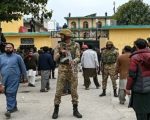TORONTO – Thousands of Indian students have taken to the streets in Canada against the recent immigration policy changes as they fear deportation by the government.
The demonstrations have been ongoing for months; however, the recent changes including the reduction in the number of Temporary Foreign Workers (TFW) have sparked concerns.
Indian students had arrived in Canada to pursue education and consequently settle in the country through citizenship; however, their dreams seem to be shattered with recent changes in immigration introduced by the Justin Trudeau government and Immigration Minister Marc Miller.
In this regard, Prince Edward Island is witnessing demonstrations by students as under the new provincial policies, a 25% reduction in permanent residency nominations would be done.
Ontario, Manitoba, and British Columbia (BC) are also witnessing these protests by the students who decry the recent changes at a time when the government has announced to reduce the entry of international students by 35 percent as compared to 2023.
As part of the changes in the ongoing year, the government also announced that foreign nationals can no longer apply for a post-graduation work permit (PGWP) at the border through a practice named “flagpoling” under which temporary residents exit and re-enter Canada to expedite work or study permit applications.
During the ongoing week, Canadian Premier Justin Trudeau announced a reduction in the number of temporary foreign workers employed in low-wage jobs. Under the fresh directive, Canada will halt the processing of Labour Market Impact Assessments (LMIAs) for the low-wage stream in areas with an unemployment rate of 6% or higher, with exceptions for a few jobs.
As part of the changes, employers can now only hire up to 10% of their workforce through the Temporary Foreign Worker Program’s Low-Wage stream, down from the previous limit. Moreover, the maximum employment duration for these workers will be reduced to one year from the current two years.
A major factor behind these protests is the demand for more slots in the Provincial Nominee Program (PNP) which enables provinces and territories to nominate candidates for permanent residency based on their skills, work experience, and ability to contribute to the local economy; however, at present there are only a limited number of slots available, making the competition intense.
On top of this, Prince Edward Island (PEI), Canada’s smallest province, announced a 25% cut in immigration permits, sparking widespread protests from hundreds of students now facing the threat of deportation.
As far as Indian students are concerned, they are of the opinion that the government took advantage of them and now they are on the verge of being deported. The international students are urging the government to extend post-graduate work permits, create clear and consistent routes to permanent residency, and tackle the systemic problems leading to their exploitation.














